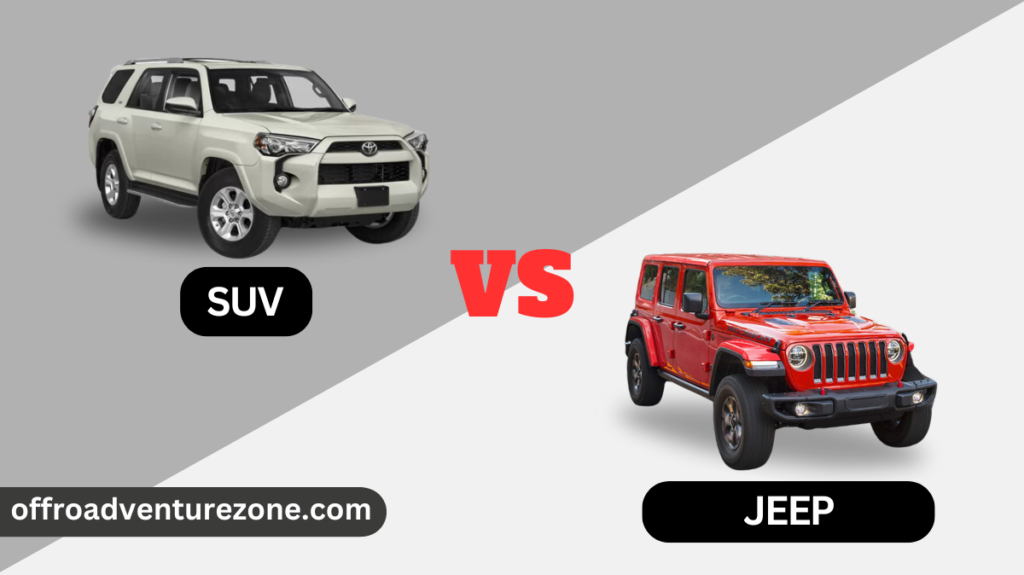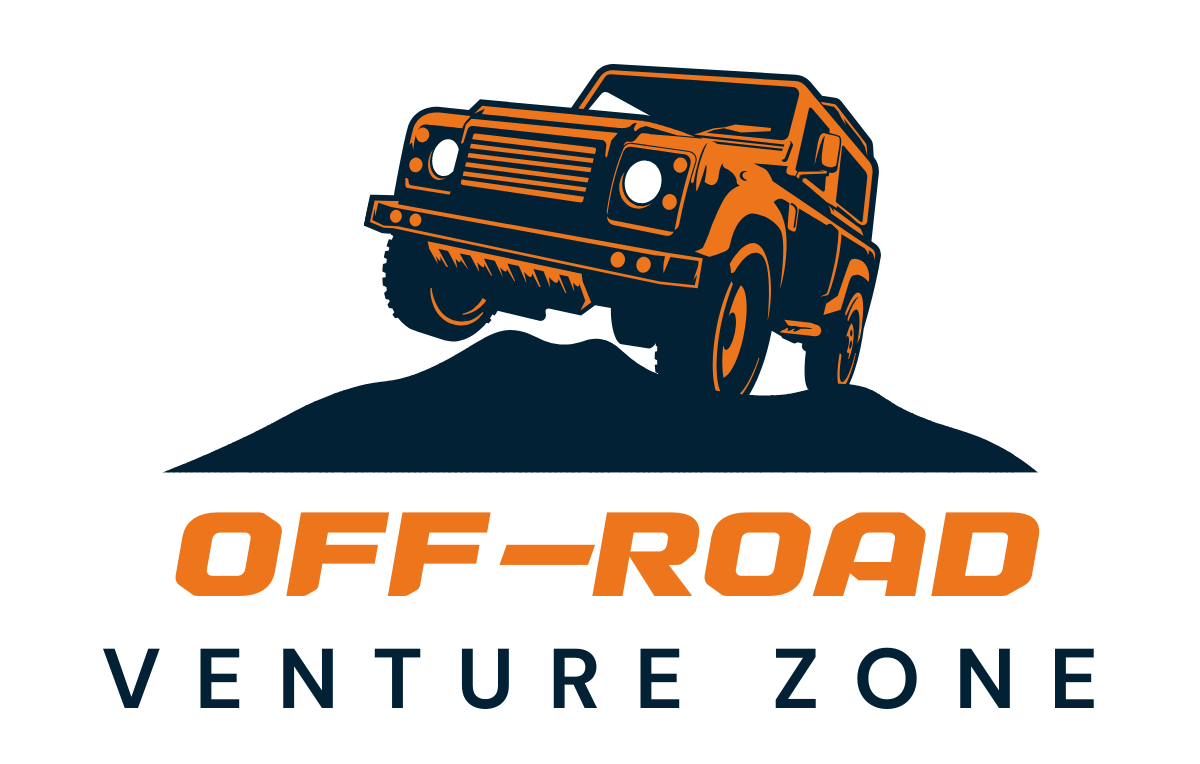When you’re looking to buy a car, you might hear a lot about SUVs and Jeeps. But what are the differences? Both SUVs and Jeeps are great for different reasons, and it can be confusing to choose between them.
We’ll compare SUVs and Jeeps in simple terms so you can make the right choice for you. We will talk about things like performance, comfort, safety, fuel efficiency, and much more.

Contents
- 1 SUV vs Jeep Vehicle
- 2 What is an SUV?
- 3 What is a Jeep?
- 4 Terrain & Performance
- 5 Comfort and Ride Quality
- 6 Fuel Efficiency
- 7 Safety
- 8 Practicality and Versatility
- 9 Durability and Longevity
- 10 Overall Usage
- 11 Driving Experience for Beginners
- 12 Resale Value
- 13 Technology Features
- 14 User Reviews and Ratings
- 15 Cost Comparison
- 16 Conclusion
SUV vs Jeep Vehicle
The main difference between SUVs and Jeeps is their design purpose. SUVs are made for comfortable family travel on regular roads, while Jeeps were originally built for military use and off-road adventures. SUVs typically offer more space and comfort, whereas Jeeps focus on rugged performance.
Now, let’s create a detailed comparison table for SUV vs Jeep Vehicle:
| Feature | SUV | Jeep |
| Size | Usually bigger | Usually smaller |
| Comfort | More comfortable seats and space | Basic comfort |
| Use | Daily city driving and family trips | Off-road and adventure |
| Fuel use | Uses more gas | Uses less gas |
| Price | Often more expensive | Usually less expensive |
| Storage | Lots of space for bags | Less storage space |
| Riding feel | Smooth ride | Bouncy ride |
In summary: Think of it this way: An SUV is like a big, comfy car perfect for taking your family to school or the mall. A Jeep is more like a tough explorer vehicle, great for climbing mountains and driving through mud. If you want comfort, pick an SUV. If you want adventure, choose a Jeep.
What is an SUV?
An SUV stands for Sport Utility Vehicle. It’s a type of car that is bigger than a regular car and is built to carry more people and stuff. SUVs are designed to drive on both regular roads and some off-road trails, but they are mostly used on paved roads. They are great for families because they have lots of space.
What is a Jeep?
A Jeep is a type of SUV, but it’s built for off-roading, which means driving on rough, uneven ground. Jeeps are known for their ability to drive on rocks, mud, and even snow. They are strong and tough, making them perfect for adventure lovers who like going off the beaten path.
Let’s now compare both SUVs and Jeeps in more detail to help you choose the right vehicle.
Terrain & Performance
SUV Performance
SUVs are designed to handle different types of roads. They are great for driving on highways, city streets, and some light off-road trails. They have a feature called all-wheel drive (AWD), which helps when driving in rain, snow, or on slightly uneven roads. But, most SUVs are not made for really rough off-road trails.
Jeep Performance
Jeeps are built for off-roading. They have special features that help them drive on rocks, sand, and mud. Jeeps have four-wheel drive (4WD), which makes them extra good at going up hills or through deep mud. If you love outdoor adventures or camping in the wild, a Jeep is a great choice.
Comfort and Ride Quality
SUV Comfort
If comfort is important to you, SUVs are often the better choice. They provide a smoother ride because they are built with bigger wheels and better suspensions to handle bumpy roads. Many SUVs also have comfortable seats, air conditioning, and quiet cabins. They are perfect for long drives or family road trips.
Jeep Comfort
Jeeps are a bit more rough than SUVs. They are designed to handle tough conditions, so they don’t always feel as smooth on normal roads. The ride can be bumpy, especially in older models like the Jeep Wrangler. While some newer Jeeps are more comfortable, they are still not as smooth as most SUVs.
Fuel Efficiency
SUV Fuel Efficiency
SUVs are often more fuel-efficient than Jeeps. This means they can go further on less gas. Some SUVs, like the Toyota Highlander Hybrid, can save even more gas. If you plan on driving a lot and want to save money on fuel, an SUV is a good choice.
Jeep Fuel Efficiency
Jeeps use more fuel than SUVs because they are built to handle tough terrain. The Jeep Wrangler, for example, has a powerful engine, but it doesn’t get the best gas mileage. If you mostly drive on highways and city streets, a Jeep may cost you more in gas over time.
Safety
SUV Safety Features
When it comes to safety, SUVs usually have a lot of features to protect you. Many SUVs come with things like airbags, anti-lock brakes, and special systems to help you avoid accidents. They are also designed to keep you safe if there’s a crash. Many SUVs have great safety ratings and are known for being good choices for families.
Jeep Safety Features
Jeeps are also safe, but they focus more on being tough and durable for off-roading. Some newer Jeep models have great safety features, but older Jeeps like the Wrangler may not have as many advanced safety systems as SUVs. If you want the safest ride, check out newer Jeep models with modern safety features.
Practicality and Versatility
SUV Practicality
SUVs are great for families and people who need extra space. They have lots of room for passengers, groceries, and even sports equipment. Many SUVs have seats that can fold down to make even more room for large items. This makes SUVs very practical for everyday use.
Jeep Practicality
Jeeps are versatile, but they are not as practical as SUVs for families. For example, the Jeep Wrangler has less room in the back and doesn’t have a lot of trunk space. However, if you like to carry bikes or gear for outdoor activities, a Jeep can still be practical. Also, the Jeep Gladiator is a truck version of a Jeep, which gives you a bed for carrying large items.
Durability and Longevity
SUV Durability
SUVs are made to last a long time. With good care, many SUVs can run for many years. Brands like Toyota and Honda are known for making durable SUVs that keep running well for a long time.
Jeep Durability
Jeeps are also built to last, especially when it comes to off-road driving. The Jeep Wrangler is famous for its durability and ability to take a beating. If you want a vehicle that can handle harsh conditions like mud, rocks, or deep snow, a Jeep is a great choice.
Overall Usage
SUV Overall Usage
SUVs are great for people who need a vehicle for everyday driving. They can drive on highways, city streets, and light off-road trails. They are practical for families because they have lots of space and are easy to drive. If you need a car for commuting, road trips, or carrying things around, an SUV is perfect.
Jeep Overall Usage
Jeeps are great for people who like to go on adventures or spend a lot of time outdoors. They are perfect for camping trips, trail driving, or exploring rough terrains. However, if you only need a car for everyday driving in the city, a Jeep might not be the most comfortable choice.
Driving Experience for Beginners
SUV for Beginners
If you’re a beginner driver, an SUV might be easier for you to drive. SUVs are smooth and stable on the road, and many newer models have easy-to-use features like rearview cameras and parking sensors. They are perfect for learning how to drive, especially in busy traffic.
Jeep for Beginners
Jeeps are a little harder to drive, especially for beginners. They have a rougher ride and require more skill, especially when driving off-road. If you are new to driving and want something smooth and easy to handle, an SUV is the better choice.
Resale Value
SUV Resale Value
SUVs generally have a good resale value, which means they keep their worth well over time. If you decide to sell your SUV later, you can often get a good amount of money for it. Brands like Honda and Toyota are known for their strong resale value.
Jeep Resale Value
Jeeps also hold their value well. The Jeep Wrangler is especially known for this. People love Jeeps, and there is always demand for used Jeeps, especially the off-road models. If you buy a Jeep, you might get a good price if you decide to sell it in the future.
Technology Features
SUV Technology
Modern SUVs come with lots of cool technology like big touchscreens, Bluetooth for your phone, and Apple CarPlay or Android Auto. Some SUVs also have things like adaptive cruise control or lane-keeping assist to make driving easier.
Jeep Technology
Jeeps also have technology features like touchscreens, Bluetooth, and navigation. However, because Jeeps are built for off-road adventures, their focus is more on rugged features than advanced tech. But don’t worry, new Jeeps have lots of tech to make driving more fun and easier.
User Reviews and Ratings
Here’s what users think about SUVs and Jeeps:
| Vehicle Type | Average User Rating | Key User Comments |
| SUV | ⭐⭐⭐⭐⭐ 4.3 | “Comfortable, great for families, reliable” |
| Jeep | ⭐⭐⭐⭐⭐ 4.5 | “Amazing off-road, fun to drive, tough” |
Cost Comparison
Here’s a quick look at the cost for both SUVs and Jeeps:
| Vehicle Type | Average Price (USD) | Maintenance Costs (Annually) | Fuel Economy (MPG) |
| SUV | $35,000 | $500 | 22-28 |
| Jeep | $35,000 | $600 | 15-20 |
Conclusion
The right choice between an SUV and a Jeep depends on what you need. If you want a comfortable, family-friendly vehicle that’s good for everyday driving, an SUV is a great option.
But if you love off-roading and exploring tough terrain, a Jeep is built just for that. Both vehicles have their strengths, so think about what’s most important for you—whether it’s comfort, off-road ability, fuel efficiency, or technology.
Are SUVs good for off-roading?
Yes, some SUVs can go off-road, but they aren’t as tough as Jeeps.
Which vehicle costs more to maintain?
Jeeps generally cost a bit more to maintain because they have more off-road features.
Can I use a Jeep for daily driving?
Yes, but Jeeps may feel bumpy on regular roads compared to an SUV.
Do SUVs save more gas?
Yes, most SUVs are more fuel-efficient than Jeeps.
Do Jeeps last a long time?
Yes, Jeeps are known for being very durable, especially for off-road driving.
